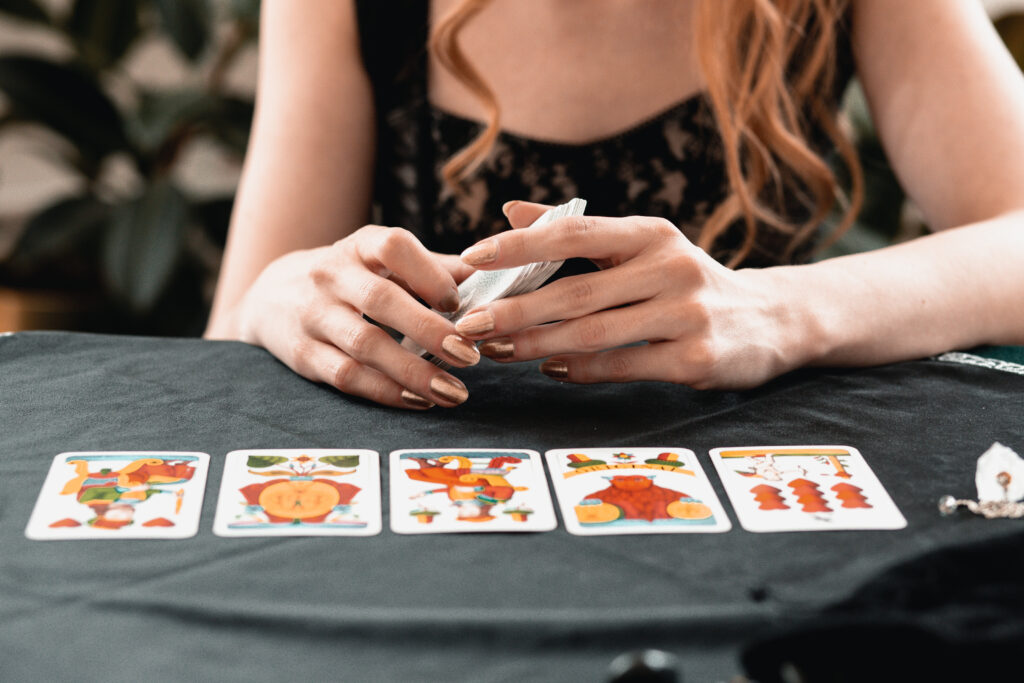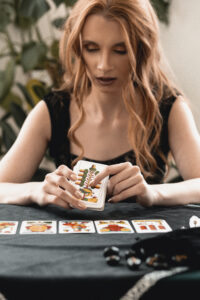The Medieval Bohemian Playing Cards, known as ‘Maryashki’ (The Devil’s Marriage, the name of the most popular card game) is an ancestral oracle that was passed on to me from the older generation of Traditional Eastern European fortune tellers. Little has been written about this method, as it can only be learned through oral tradition. These cards have been used for telling fortunes and gambling for hundreds of years in Prague.

Ace of Acorns featuring Beelzebub holding in his claws the Municipal Coat of Arms of Prague.
The city coat of arms is held by the Devil himself on the Ace of Acorns, the much-feared card of devilry and misfortune. The deck also features the Eye of Providence, God’s Angel, and a Magician who all represent the supernatural forces warring over the querent’s life. The four suits represent the judgment from the Spirit World for the querent,m which might range from the very favorable (Hearts) to ill fortune (Acorns). The entirety of human life is encompassed in these cards, which also represent social classes and the court.

Many questions, mostly of a mundane nature, are answered by these cards –
- Questions about health, addiction, and vice
- Marital fidelity, domestic peace, a person’s loyalty
- Prosperity and business
- Presence of foes and enemies
- Curses and hostilities
- Presence of magic, and protection from Higher Power
- Unlike contemporary divination decks, they do list specific misfortunes such as prison. conspiracy to murder, insanity, ill health, etc.

There is a bit of traditional etiquette around doing Bohemian Card Readings, which must be honored when I do them.
- We arrange for a good time for us to have a live call. This type of reading requires your attention, and cannot be delivered in writing or voicemail.
- Oddly, there was no prohibition for the Querent being inebriated, as it was often practiced in pubs after timid folks gained Dutch courage to approach the fortune teller… let’s not do that.
- I cannot be asked to withhold any unfavorable answers. The tradition demands I give warnings about enemies, curses, and impeding misfortunes that are coming or already present in the Querent’s life, unbeknownst to them.
- It is ill-advised to seek out another reader, not even to ask them about the same matter, but to seek one at all. You should wait until every event denoted in the reading has passed, which used to be years rather than months.
- Tradition allows this reading to be given in hospitality exchange, which means for accommodations or food. If I am your guest at the time of reading, you are free from monetary obligations. I believe this relates to this oracle being under the Patronage of Beelzebub, who is known as the Patron of hospitality in Bohemia.

Traditionally, the Querent was expected to be silent for the most part, and the readings were given in a ‘blind’, discreet way, illicitly, as the Fortune Teller and their Client both had concerns about that which was being shared. People didn’t tell Fortune Tellers their business, and the Fortune Tellers did not inquire. They simply made a few initial statements, such as ‘You are married to a man who is a professional and you have two kids’ which the client affirmed, proving to both sides that the correct Spiritual Connection has been established.
Nowadays, most readers don’t operate this way anymore, they answer specific questions from their clients but they still adopt a discreet secretive way of asking personal things, in my personal opinion this sentiment has been preserved because of the types of shady people who engaged in divination, and the matters which were discussed often being some kind of treachery, plot, etc. Think Mademoiselle Lenormand and her salon in times of Napoleonic Wars.
Divination was still vaguely illicit and prosecuted well into the 20th century, or seen as something unsavory before the very recent New Age boom that introduced Tarot decks into every bookstore.
Most of us therefore knew the cards as an instrument of vice, for gambling, something that was cussed about by drunks and housewives, who bemoaned their alimonies gambled away. Playing cards were considered an unlucky object to steal or to possess by miners and sailors. There are numerous faery tales that depict a cursed haunted inn where devils or the dead play a deadly set of cards every night and kill the loser…
But every once in a while, the Devil may show his friendlier face, as the Hunstman or the Landlord. Nearly every brewery in Czechia at some point had a Horned One as their symbol, and legends speak of also the Devil who disguised himself as a stellar cook to seduce the monks into the sin of Gluttony. These cards certainly warn of excesses, a give a no-nonsense opinion about the dealings of the Querent.
You can now book your reading with me. The Devilish minimum suggested donation that I will accept is $66.






